|
BIOGRAPHIES
Source:
Centennial
Biographical History of Hancock Co., Ohio
Pub: New York & Chicago by The Lewis Publishing Company
1903
<
CLICK
HERE TO RETURN TO 1903 BIOGRAPHICAL INDEX >
< CLICK HERE TO RETURN TO LIST OF BIOGRAPHICAL INDEXES >
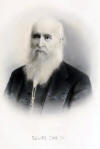
Squire Carlin
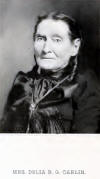
Mrs. Delia B. G. Carlin |
SQUIRE CARLIN.
Hancock county has been the home and scene of labor
of many men who have not only led lives that should
serve as an inspiration to those who come after them
but have also been of important service to their
country and state through various avenues of
usefulness. Among them must be named the
honored pioneer, Squire Carlin, who located
here in 1826 and for many years was prominently
identified with the growth and development of his
adopted county.
Mr. Carlin was born near Auburn, New York, on
the 25th of December, 1801, and was the oldest son
and second child in a family of seven children.
In the winter of 1806-7, when he was but five years
old, the family left the Empire state and traveled
westward to Erie, Pennsylvania, where they remained
a few months. Late in the spring of 1807 they
boarded a sailing vessel and proceeded by lake to
the mouth of the Huron river, settling on the south
shore of Lake Erie, a short distance west of the
place of landing. The Carlins were the
second white family to locate in Huron county Ohio,
but remained there only one year, when they removed
to the river Raisin, settling on the opposite side
of the river from Frenchtown, about two and one-half
mile east of the site of Monroe, Michigan, where
they lived until the summer of 1809. They next
located on the site of Maumee City, now in Lucas
county, Ohio, where the father continued peacefully
tilling the soil until after Hull's surrender
in August, 1812, when the report coming of hostile
Indians caused them to flee southward over Hull'
trail. Our subject's mother, with her
children, mounted on two horses and carrying
provisions for the journey and a few household
articles, accompanied a band of refugees to Urbana,
while her husband remained behind with the hope of
saving his stock, etc., but his efforts were futile
as all his belongings fell a prey to the savages and
their English allies. The refugees passed
through Fort Findlay and saw the soldiers still
working on the block houses which were commenced the
previous June. After stopping in Urbana for a
couple of months, the Carlins located on Buck
creek, east of the village, where they lived until
1814, when Squire and his father returned to
Maumee, built a cabin near Fort Meigs and raised a
crop of corn on what is now known as War Club
Island. The following year they were joined by
the other members of the family and moved to the old
clearing north of the river. The buildings on
the place had been burned by the British and Indians
and new ones had to be erected. The parents
spent the remainder of their lives on the Maumee.
It was there that Squire Carlin grew to manhood
with no school privileges whatever, except three
months on the Maumee river, and all the education
that he possessed was acquired after he located in
Findlay. In April, 1821, he was united in
marriage to Sarah Wolcott, whose parents
settled on the Maumee at the close of the war of
1812. By this union were born ten children,
but only three reached years of maturity, W. D.
the eldest of these was a surgeon in the Union army
during the Civil war, and died in 1862; J. E. H.,
now a resident of Findlay, crossed the plains with
his father in 1849, and again went to the Pacific
slope in 1853, spending twelve year in California
and fourteen years in Nevada. He was
interested in a quartz mill for some years and also
did some mining. Sally W., the only
surviving daughter, is the widow of Judge G. W.
Myers. The mother of these children died
in 1850.
Mr. Carlin visited Findlay several times before
and after the settlement of Wilson Vance in
1821, and in November, 1826, purchased a lot on the
southwest corner of South Main
and West Front streets from Joseph Vance
and Elnathan Cory, the original town
proprietors. This property is still in
possession of his widow, it being the oldest
continuous title in Hancock county. In a cabin
built upon this lot he opened the first store in
Findlay, his trade being to a great extent with the
Indians. In 1828 he was joined by his brother
Parlee and together they carried on business
under the firm name of S. & P. Carlin for
many years. Our subject spent much of his time
traveling through the forest buying furs from the
Indians, white hunters and small traders.
These he would take to Detroit, where they were
shipped to London, England. One winter MR.
Carlin purchased four thousand and six hundred
deer skins and seven thousand coon skins.
While engaged in the fur trade he suffered many
hardships and privations. While on one of his
trips in the winter of 1828 and very hungry, he came
upon an Indian camp in the forest where several
dressed animals were roasting before a log fire.
Jumping from his horse he cut off a large slice of
the roasting meat. One of the Indians present,
seeing the avidity with which he ate: "You like um
fox?" "Yes," said Mr. Carlin, "don't
you?" The Indian shook his head. "Then
why do you roast them?" was asked. "For my
dogs," replied the Indian, who seemed much amused
over the incident. The meat, however, tasted
good to the hungry trader, who first supposed the
animals to be coons, a much prized dish among the
pioneers. Squire and Parlee
Carlin carried on mercantile business for many
years and also conducted the grist and saw mills on
the north side of the Blanchard, on the present site
of the Union block and the traction company's plant.
These mills they owned for more than forty years.
In 1849 Mr. Carlin crossed the plains to
California, being one of a company of fifty-five
men, who started from Independence, Missouri, with
mule teams which they had brought at that place and
then broke in preparation for the journey. Our
subject remained in the Golden state for two years,
at the end of which time he returned home by water,
traveling by way of the isthmus of Panama and New
Orleans, where he had the twenty thousand dollars'
worth of gold dust brought with him converted in to
money. He then proceeded up the Mississippi
and Ohio rivers to Cincinnati, where he purchased
four watches, paying one hundred dollars each.
One of these Mrs. Carlin still owns and it is
a good timekeeper yet.
On his return to Findlay Mr. Carlin sold his
store, which he had still retained while in the west
and was then principally engaged in the loaning of
money and in speculation, though he was also
interested in general farming and the milling
business as previously stated. He accumulated
much property and became the second wealthiest man
in the county. He was largely instrumental in
building the Fremont & Indianan Railroad in 1853,
now a part of the Lake East & Western Railroad,
extending from Fremont to Union City, Indiana, but
in this venture he lost heavily, and afterward
retired from active business. He was one of
the largest landholders in this part of the state,
at one time owning several thousand acres of land in
Hancock and Wood counties. For many years he
was in the banking business in this city.
In June, 1853, Mr. Carlin was again married, his
second union being with Mrs. Delia B. G. Gardner,
who was born in Jefferson county, New York, Mar. 8,
1822, a daughter of James and Esther (Parker)
Briggs, natives of Vermont and of English
descent. Her paternal grandfather, Peter
Briggs, was born in Massachusetts and became a
very prominent politician of the Green Mountain
state, where he represented his district in the
legislature. Mrs. Carlin spent the
first fifteen years of her life in her native
county, and then accompanied her parents on their
removal to Cuyahoga county, Ohio, where she was
first married in 1842 to Charles H. Gardner.
For about a year they made their home in Wayne
county, New York, and then they removed to Vermont,
where they spent two years. The following two
years were passed in Nantucket, Massachusetts, and
from there they went to Sheffield and later to
Worcester, that state, but finally located in
Cleveland, Ohio. Mr. Gardner died at
St. Augustine, Florida, in 1848, and a year later
his widow returned to Cleveland. Subsequently
she took up her residence in Columbus, Ohio, where
she engaged in teaching school for some time, and it
was there that she met Mr. Carlin, to whom
she gave her hand in marriage in June, 1853.
By her first union she had one daughter, Francis
R. G., who first married C. Yonker and
for her second husband wedded Edmond Dodd.
By his second marriage Mr. Carlin had three
children: Frederick P., who is now
engaged in the hotel business in Findlay; Alice
May, who died at the age of twelve years; and
one who died in infancy.
Religiously Mr. Carlin was a prominent member of
the Methodist Episcopal church, and died in that
faith on the 29th of November, 1892. In
politics he was a life-long Democrat and during his
early years took a very active and influential part
in public affairs. He was the third postmaster
of Findlay, in which office he served from 1831 to
March, 1849, a period of nearly eighteen years.
He was also treasurer of the county from June, 1831,
to June, 1839. In his dealings he was ever
prompt, reliable and entirely trustworthy, and
although he gained a far greater degree of success
than comes to most men, it was because of his very
energetic, persevering and capable management of his
affairs. He was widely and favorably known and
in his death the community lost one of its best
citizens. Mrs. Carlin is one of
the leading and most highly respected women of
Findlay.
Source: Centennial Biographical
History of Hancock Co., Ohio - Pub: New York & Chicago by The
Lewis Publishing Company - 1903 - Page 192 |
| |
C. A. CARPENTER
Source: Centennial Biographical
History of Hancock Co., Ohio - Pub: New York &
Chicago by The Lewis Publishing Company - 1903 -
Page 335 |
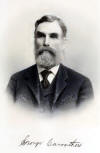
George Carrothers
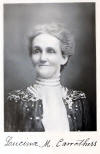
Lucina M. Carrothers |
GEORGE CARROTHERS
Source: Centennial Biographical
History of Hancock Co., Ohio - Pub: New York &
Chicago by The Lewis Publishing Company - 1903 -
Page 12 |
| |
CYRUS L. CASTERLINE
Source: Centennial Biographical
History of Hancock Co., Ohio - Pub: New York &
Chicago by The Lewis Publishing Company - 1903 -
Page 550 |
| |
PRESTON B. CATHERS
Source: Centennial Biographical
History of Hancock Co., Ohio - Pub: New York &
Chicago by The Lewis Publishing Company - 1903 -
Page 198 |
| |
CLINTON A. CHAMBERS
Source: Centennial Biographical
History of Hancock Co., Ohio - Pub: New York &
Chicago by The Lewis Publishing Company - 1903 -
Page 221 |
| |
DAVID U. CHAMBERS
Source: Centennial Biographical
History of Hancock Co., Ohio - Pub: New York &
Chicago by The Lewis Publishing Company - 1903 -
Page 573 |
| |
J. Z. CHASE
Source: Centennial Biographical
History of Hancock Co., Ohio - Pub: New York &
Chicago by The Lewis Publishing Company - 1903 -
Page 172 |
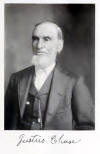
Justus Chase
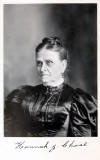
Hannah J. Chase |
JUSTUS CHASE
Source: Centennial Biographical
History of Hancock Co., Ohio - Pub: New York &
Chicago by The Lewis Publishing Company - 1903 -
Page 24 |
| |
HARVEY G. CLARK
Source: Centennial Biographical
History of Hancock Co., Ohio - Pub: New York &
Chicago by The Lewis Publishing Company - 1903 -
Page 42 |
| |
JAMES R. CLARK
Source: Centennial Biographical
History of Hancock Co., Ohio - Pub: New York &
Chicago by The Lewis Publishing Company - 1903 -
Page 317 |
| |
JOSEPH B. CLAYTON
Source: Centennial Biographical
History of Hancock Co., Ohio - Pub: New York &
Chicago by The Lewis Publishing Company - 1903 -
Page 393 |
| |
THOMAS H. CLYMER,
a young man of superior business ability and
executive force, whose labors are bringing to him
creditable and gratifying success in industrial
circles, is a native son of the Buckeye state.
His birth occurred in Union township, Hancock
county, on the 16th of November, 1861, and he is a
grandson of Francis and Susan Clymer, who
removed from Fairfield county, Ohio, to Hancock
county in 1834, being accompanied by their family
and the father of our subject was one of the number.
Francis Clymer entered one hundred and sixty
acres of government land in Union township, one
hundred and eight acres of which is now owned by his
son David, and he was one of the sturdy old
pioneers of the commonwealth. With his family,
consisting of six children, three of whom are now
living, he endured the privations incident to a new
and unsettled country, and he nobly endured the
privations incident to a new and unsettled country,
and he nobly bore his share in its subsequent
development and improvement. Both he and his
wife lived to a good old age, and in their death the
community suffered the loss of true and upright
citizens.
David Clymer, the father of him whose name
introduces this review, is now the only member of
his father's family residing in Hancock county.
He was born in Fairfield county, Ohio, in 1828, and
in his youth accompanied his parents on their
removal to this county, where he has won an enviable
place among the progressive and influential
agriculturists of his community. His landed
possessions consist of about eight hundred acres,
and he is recognized as one of the largest real
estate owners in Hancock county. His career
has ever been such as to warrant the trust and
confidence of the business world, for he has always
conducted all transactions on the strictest
principles of honor and integrity, and at the same
time his devotion to the public good is
unquestioned. Mr. Clymer was united in
marriage to Emily Cook, also a native of
Fairfield county, where her birth occurred in 1830,
and this union was blessed by the birth of eight
children, five of whom are now living, and all are
residents of Hancock county. They have all een
provided with excellent farms, the result of the
father's forethought and enterprise. In
political matters the Clymers have long been
allied with Democratic principles.
Thomas H. Clymer, the immediate subject of this
review, was reared and educated in the township of
his nativity, and here he has spent his entire life.
After completing his studies he assisted his father
in the work of the home farm until his marriage,
after which he purchased and removed to his present
place. He is a young man of exceptional
promise, and his fellow townsmen, recognizing his
worth and ability, have chosen him as a member of
the school board, in which capacity he has served
for seven years. For his wife he chose Miss
Nora, the daughter of Henry Aurand.
Their marriage was celebrated in 1884, and four
children, have come to brighten and bless their
home, - Jessie, Estella, Lewis and Grace.
Mrs. Clymer was born in Blanchard township,
Hancock county, in 1866. The family are held
in high esteem in Hancock county, and their many
excellent qualities render them favorites with a
large circle of friends. Mr. and Mrs.
Clymer are members of the United Brethren church
Source:
Centennial Biographical History of Hancock Co., Ohio - Pub: New
York & Chicago by The Lewis Publishing Company - 1903 - Page 292 |
|
|
ALDEN
H. COBB
Source:
Centennial Biographical History of Hancock Co., Ohio
- Pub: New York & Chicago by The Lewis Publishing
Company - 1903 - Page 268 |
|
|
MARION
A. COBB
Source:
Centennial Biographical History of Hancock Co., Ohio
- Pub: New York & Chicago by The Lewis Publishing
Company - 1903 - Page 261 |
|
|
RALPH
D. COLE
Source:
Centennial Biographical History of Hancock Co., Ohio
- Pub: New York & Chicago by The Lewis Publishing
Company - 1903 - Page 553 |
|
|
WILLIAM
W. COLE
Source:
Centennial Biographical History of Hancock Co., Ohio
- Pub: New York & Chicago by The Lewis Publishing
Company - 1903 - Page 167 |
|
|
NELSON
COLEMAN
Source:
Centennial Biographical History of Hancock Co., Ohio
- Pub: New York & Chicago by The Lewis Publishing
Company - 1903 - Page 279 |
|
|
WARNER
COONTZ
Source:
Centennial Biographical History of Hancock Co., Ohio
- Pub: New York & Chicago by The Lewis Publishing
Company - 1903 - Page 298 |
|
|
ISAAC
W. COOPER
Source:
Centennial Biographical History of Hancock Co., Ohio
- Pub: New York & Chicago by The Lewis Publishing
Company - 1903 - Page 443 |
|
|
ROBERT
A. COOPER
Source:
Centennial Biographical History of Hancock Co., Ohio
- Pub: New York & Chicago by The Lewis Publishing
Company - 1903 - Page 565 |
|
|
CLINTON
CORTHELL
Source:
Centennial Biographical History of Hancock Co., Ohio
- Pub: New York & Chicago by The Lewis Publishing
Company - 1903 - Page 495 |
|
|
HEZEKIAH CORWIN
Source:
Centennial Biographical History of Hancock Co., Ohio
- Pub: New York & Chicago by The Lewis Publishing
Company - 1903 - Page 161 |
|
|
MILLARD
D. COWLEY
Source:
Centennial Biographical History of Hancock Co., Ohio
- Pub: New York & Chicago by The Lewis Publishing
Company - 1903 - Page 68 |
|
|
ANDREW
CRAMER
Source:
Centennial Biographical History of Hancock Co., Ohio
- Pub: New York & Chicago by The Lewis Publishing
Company - 1903 - Page 149 |
|
|
GEORGE
E. CRAMER
Source:
Centennial Biographical History of Hancock Co., Ohio
- Pub: New York & Chicago by The Lewis Publishing
Company - 1903 - Page 34 |
|
|
JOSEPH
CRAMER
Source:
Centennial Biographical History of Hancock Co., Ohio
- Pub: New York & Chicago by The Lewis Publishing
Company - 1903 - Page 139 |
|
|
WILLIAM
J. CREIGHTON
Source:
Centennial Biographical History of Hancock Co., Ohio
- Pub: New York & Chicago by The Lewis Publishing
Company - 1903 - Page 241 |
|
|
JAMES
CROSS
Source:
Centennial Biographical History of Hancock Co., Ohio
- Pub: New York & Chicago by The Lewis Publishing
Company - 1903 - Page 121 |
|
|
JOHN H.
CROSS
Source:
Centennial Biographical History of Hancock Co., Ohio
- Pub: New York & Chicago by The Lewis Publishing
Company - 1903 - Page 560 |
|
|
FRANK
R. CROWELL
Source:
Centennial Biographical History of Hancock Co., Ohio
- Pub: New York & Chicago by The Lewis Publishing
Company - 1903 - Page 594 |
|
|
JAMES
M. CUSAC
Source:
Centennial Biographical History of Hancock Co., Ohio
- Pub: New York & Chicago by The Lewis Publishing
Company - 1903 - Page 85 |
|
|
WILLIAM
CUSAC
Source:
Centennial Biographical History of Hancock Co., Ohio
- Pub: New York & Chicago by The Lewis Publishing
Company - 1903 - Page 85 |
|
|
WILLIAM
J. CUSAC
Source:
Centennial Biographical History of Hancock Co., Ohio
- Pub: New York & Chicago by The Lewis Publishing
Company - 1903 - Page 390 |
|
![]()
![]()